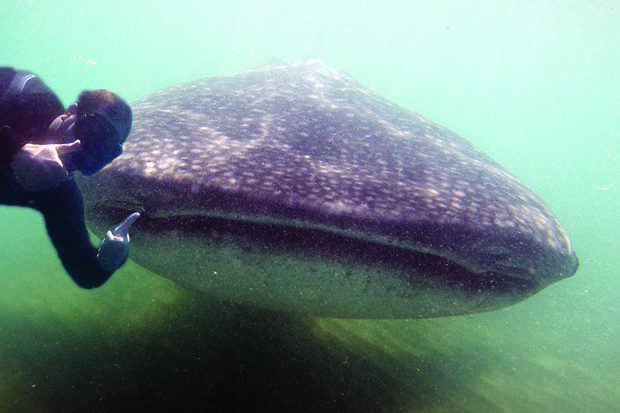Get Credits While Swimming in Baja
WHALE SHARK: Students swim with the largest known species of fish (Rhincodon typus) while studying in Baja California this summer.
Students can swim with whale sharks and sea lions, see many species of dolphins, learn about marine biology, and get the transferrable credits to UC/CSU and USC as they enjoy their time in Baja.
Marine Biology Lecture and Lab (Biol 125/126) will be from June 19 – July 17 and will consist of 15 days of hands-on experiences. Students need to sign up soon because it is a regular class and the space in the college’s field station is limited.
“It’s nice and comfortable to take classes there and that’s where we meet everyday before we start our days,” said Javier Gago, marine biology professor.
Gago is set to take students on the college’s annual Baja California field studies program, which started back in 1974. Students will obtain transferrable college credit for the marine biology lecture and lab course.
As students swim with marine life, they have an experience that is unique to the trip. The firsthand experience in the ocean, with guidance from instructors, helps students retain information effectively through the interesting and eye-catching scenes.
The trip in Baja is from July 3 to July 17, and the beginning of the course will be on campus. The trip will act as part of the regular class and will consist of coursework as if in a regular classroom.
“They have to study for tests, take exams, do labs, but our own experience is that they do better down there than over here,” Gago said.
The college’s field station, Estación del Mar Cortés, located in Bahía de los Angeles, offers students a safe and pleasant environment as they study for their exams and do their research.
Students in Baja will go into the water and have a close-up experience with the fish as they learn more about marine biology.
Whale sharks are “the largest of species of fish on earth. They grow to be 35-feet long, you get to swim right next to them. They are sharks, they are totally gentle,” said Gago
The students can swim with the whale sharks but are not allowed to touch the endangered animals.
Students in Baja are not allowed to walk on certain areas because of government restrictions; however, they can swim with the sea lions, and enjoy the water and beautiful weather around them.
“You’re gonna jump in the water and you’re just gonna float, they’ll come to you. And they do. You’ll have 30-40 sea lions swimming around you,” Gago said. “They almost immediately just come around and they will surround you.”
The sea lions are friendly and beautiful creatures, but they will not allow you to touch them as they will quickly swim away if you try.
There are many classes that are beginning to be offered in Baja now, including astronomy, geology, marine biology, andcreative writing.
“Almost all the classes we teach down there don’t have prerequisites, they’re transferable, and they cover parts of your general education,” Gago said. “There are scholarships because we have donors who that have donated quite a bit of money to keep the station alive.”
Donors and the college help to keep up the field station and offer scholarships for students who need it. And the teachers, who are knowledgeable with the area and their subjects, are a great resource to the students lucky enough to go to Baja.
Nareg Atteukenian is a first-year student at Glendale Community College. He graduated from Burbank High school in 2016. He is currently studying journalism...

